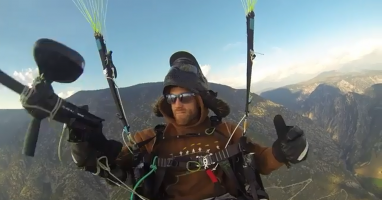This article is written by Steven Kotler, author of the soon to be released "The Rise Of Superman" and originally appeared on his blog HERE. Reposted with permission. Check out his site for tons of amazing content and to learn more about his exciting book that's about to drop. Huge thanks to Steven for allowing us to share this with our viewers!
This year, three new X Games events (skiing halfpipe and slopestyle for both skiing and snowboarding) will become Olympics sports for the first time—and not everyone is pleased.
Take Colin Cowherd, the host of ESPN radio’s The Herd with Colin Cowherd. Cowherd recently wrote a book, You Herd Me!, which, like his radio show, is a collection of short thoughts and large opinions about everything sporting and otherwise.
One of those large opinions comes from his essay “For us, Bias,” in which Cowherd argues that everyone has personal preferences and there’s no way to keep such feelings out of intelligent commentary. Cowherd believes bias unavoidable, but his real concern is access.
Access means insider knowledge, it means real, hard-earned wisdom. “What I don’t want is bias without access,” write Cowherd, “Or bias without expertise.”
Fair enough. Except, well, in the one place in the book where Cowherd fails to take his own advice: when discussing the merits of action sports.
Here’s what he has to say…
Here’s why:
X Games events are adventure and should be marketed that way. At its heart, the X Games is a series of stunts—not a sport. There’s no league, no commissioner, no officials. There are very few guidelines.
It’s bullfighting, skydiving, cliff diving—one of many competitions built on risk and risk alone.
In real sports, risk is bad. A quarterback who puts himself at risk by going headfirst instead of sliding? Bad move. In the NHL, penalties are a risk that hurt a team. Baseball is a sport of percentages, where you play by the book 90 percent of the time. Risk in baseball often means losing.
The essence of the X Games boils down to this: I can be a bigger badass than you.
Well, Cowherd, you clearly have plenty of bias, but exactly no access.
Let’s start with your main point: X Games are about risk; real sports are not. Seriously?
Why do we celebrate Brett Favre as a quarterback? It’s certainly not those Lee jeans ads. What we love about Farve was his ability to improvise under duress—i.e. to make high risk throws in high risk situations and come out on top.
Or take one of the most celebrated plays in football—John Elway’s “helicopter” play from Super Bowl XXXII—wherein he dove headfirst for a crucial first down, and got spun around mid-air. A crazy risk for the then 37-year-old player.
Those who love Kobe Bryant—hell, even those who love to hate Kobe Bryant—do so, at least in part, because of his fearlessness, his willingness to take the last shot in big games. Why is the last shot such a big deal? Because it’s the riskiest shot in the game.
A stunt is one and done. When Evil Knievel tried to jump the Snake River Canyon on a Skycycle X-2, it was a stunt. He tried, he failed, end of story.
And what about those sports that are already risky as hell and have long been part of the Olympic fare? Downhill skiing, for example, an Olympic sports since 1948? Or luge, since 1964? Or skeleton—that’s hundred-mile-an-hour headfirst sledding—since 1928. A stunt is mostly about surviving.
Moreover, to call the X Games a series of stunts is ridiculous.
A stunt is one and done. When Evil Knievel tried to jump the Snake River Canyon on a Skycycle X-2, it was a stunt. He tried, he failed, end of story.
Now, let’s compare this to a recent ESPN article about how freestyle skier Simon Dumont—one of those “adventurers” whom Cowherd believes has no business in the Olympics—spends his time preparing for competition:
“His days all go the same. Wake up. Bike 20 to 30 miles. Lift weights for four hours, do physical therapy for two hours at the U.S. ski team’s training facility on the outskirts of Park City. Head back to hotel. Rinse. Repeat.”
Does that sound like a guy training for a stunt? A one-off?
What about the three years freestyle skier Bobby Brown spent three years designing the MegaSlope—the world’s biggest slope style course ever—which he then built (with the help of Red Bull) specifically, as one Red Bull staffer pointed out: “to make Bobby better for the Olympics.”
How about the competitions themselves? A stunt is mostly about surviving. A sport is about perfection—which is exactly what is rewarded at the X Games or just about any other judged event, including perennial Olympic favorites like figure skating and gymnastics.
Hell, as far as stunts and the Olympics go, when the Dream Team came together for 1992 b-ball glory, they had what, like five weeks of time to practice together? Now—and especially from a PR perspective—that was way more of a stunt than anything we’ll see in snowboard halfpipe in Sochi.
A quarterback who refuses to slide gets injured. But at the upper edge of action and adventure sports, when an athlete pushes too far, the result isn’t just a season ending “bad move.” It’s the end. Period.
Simon Dumont, meanwhile, has been at his game at a professional level since he was 14 years old. Bobby Brown since he was 17. And when I say professional level, I mean participating in organized competition—the kind that comes with a professional tour and guidelines and, while it has no officials (just judges) or a commissioner, it certainly a prickly governing body.
Do stunts come with prickly governing bodies?
And what about those already existing Olympic sports that also lack “officials” and a “ commissioner”? Like running or swimming? Is 4-time gold medalist Missy Franklin a stuntwoman?
On top of all of this, it also appears that Cowherd knows very little about the relationship between risk and athleticism in action sports.
Are these sports risky? Sure. Absolutely. But is that all that’s going on? Of course not.
See, there’s a word for people who take unnecessary risks in action/adventure sports: dead.
A quarterback who refuses to slide gets injured. But at the upper edge of action and adventure sports, when an athlete pushes too far, the result isn’t just a season ending “bad move.” It’s the end. Period.
In other words, action sports athletes who only want to play the ‘I’m a bigger badass’ game don’t play for long.
Like all athletes, action sports athletes take measured risks. They train and train and train and try to push a little harder every day—just like every other Olympian. Their success is defined by their ability to maintain focus, make spectacular decisions and pull off extraordinary physical feats under extreme pressure—just like every other Olympian.
And despite focus and dedication that rivals any professional athlete, Simon Dumont failed to make the team for Sochi at the final qualifying competition this past weekend due to an injury. But a new generation of younger and highly talented professionals—like Bobby Brown—have come up through the ranks ready to carry the torch forward. Sound familiar? Sound like the kind of thing that happens in just about every sport, right?
Of course, Cowherd, if you actually had any access, you might know these things.
Find out more about The Rise Of Superman now and be sure to follow them on Facebook HERE for all sorts of really great content in your feed.







